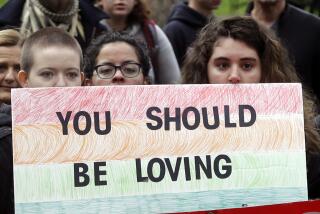Deng Didn’t Learn Lesson : Takes Wrong Tack in Attacking Messengers, Not the Problems
- Share via
There is tragic irony in Deng Xiaoping’s current hard-line resistance to widespread public demands for political reform in China. A little more than a decade ago, Deng rode to power on the crest of a similar wave of popular discontent. Sadly, China’s paramount leader seems to have all but forgotten the primary lesson of his own ascendancy: Killing the messenger is no antidote for bad news.
In January, 1976, there was a similar show of civil defiance in Tian An Men Square following the death of another popular Chinese leader, Deng’s longtime friend and mentor, Premier Zhou En-Lai. That set in motion a chain of events that brought Deng to power as hero of a citizens’ revolt against governmental disdain for the common man.
Following Zhou’s death, a small clique of radical ideologues, the so-called Gang of Four, banned all public mourning ceremonies for fear that popular displays of grief for the deceased premier might undercut their own political authority. Denied legitimate channels of expression, a wave of repressed popular sentiment--a mixture of sorrow and resentment, additionally fueled by a decade of radical-induced Cultural Revolution turmoil--welled up within the Chinese people.
The wave crested a few months later, on the occasion of a traditional Chinese festival honoring the memory of departed ancestors. On April 4, 1976, tens of thousands of people spontaneously congregated at Tian An Men Square, where they placed commemorative wreaths, poems, and essays honoring Zhou at the foot of a monument to the heroes of the Chinese revolution. Some of the poems and essays referred pointedly, and poignantly, to the feelings of powerlessness and rage experienced by ordinary Chinese citizens who had been peremptorily precluded from openly displaying their grief. Other posters referred obliquely to the destruction wrought by the radical leaders of China’s chaotic Cultural Revolution.
Fearing a new wave of popular unrest, the Gang of Four moved quickly to control the situation at the square. They ordered the offending wreaths and writings removed under cover of darkness. The next day, as more than 100,000 angry citizens converged on the square demanding to know who had been responsible for the removal, the Gang called in the army and security police to restore order. Hundreds of protesters were arrested in the ensuing confrontation; dozens were beaten, some of whom subsequently died of their injuries. The demonstration itself was officially labeled by the Politburo as “counterrevolutionary.”
Searching for a scapegoat upon whom to pin responsibility for the incident, the Gang of Four claimed that the masses had been “hoodwinked” and “incited” by a notorious anti-party, anti-socialist troublemaker. The troublemaker’s name? Deng Xiaoping, erstwhile protege of Zhou. Having been effectively discredited, Deng was peremptorily stripped of all official posts and titles. For months thereafter he was relentlessly vilified in the radical-controlled Chinese mass media as an “unrepentant capitalist roader.”
Deng’s descent into political purgatory was short-lived. Responding to a mounting popular “crisis of confidence” that swept through China following the September, 1976, death of Mao Tse-tung and the arrest a month later of the Gang of Four (on charges of conspiring to usurp party leadership), the Politburo quietly rehabilitated Deng in 1977. A year later, party leaders reversed their original verdict on the Tian An Men incident, exonerating Deng and retroactively declaring the incident to be “fully revolutionary.” Thus vindicated, Deng quickly consolidated his gains, riding to power on a wave of popular revulsion over governmental high-handedness and disdain for the vox populi.
There is something eerily, uncannily familiar about the drama currently being enacted in Tian An Men Square. Once again, as in 1976, a massive, spontaneous outpouring of repressed sentiment has occurred at the very heart of the Chinese capital, fueled this time by a decade of uneven economic reform that, for all its genuine accomplishments, has dramatically increased income inequality in China spawned high rates of urban inflation, and multiplied the opportunities for ill-gotten gain via corruption and nepotism. Once again, the powers that be have sought to slander what is clearly an authentic mass protest movement as the work of a small handful of “counterrevolutionary” conspirators. Once again the army has been called in to restore order, by force if necessary; once again a political purge is in the offing.
What is so tragically ironic about all this is that now it is Deng Xiaoping himself who is playing the role of autocratic antihero previously performed by the Gang of Four. With dour, colorless Premier Li Peng as his stalking horse, Deng has instinctively opted to clamp down on the perceived sources of dissent and disorder --China’s liberal intelligentsia. Like countless Chinese emperors before him, Deng has opted for order over equity, obedience over authenticity.
In the short run, the party and army undoubtedly have the capacity to impose a crackdown on a few hundred or even a few thousand dissident intellectuals. In the long run, however, a strategy of “killing the messenger” can only prove counterproductive, a lesson Deng seems to have learned but then forgotten.
More to Read
Sign up for Essential California
The most important California stories and recommendations in your inbox every morning.
You may occasionally receive promotional content from the Los Angeles Times.










